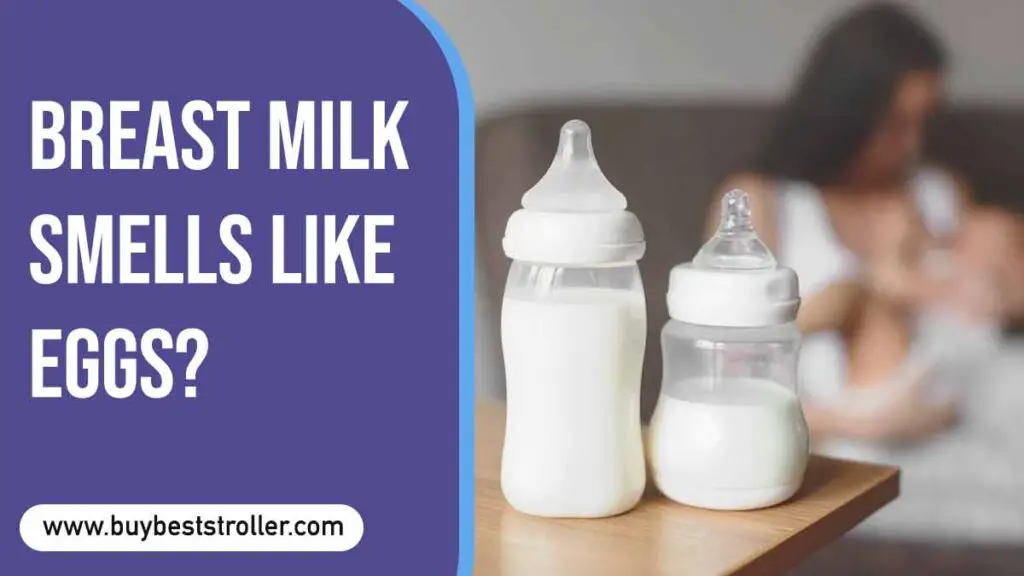We’ve all been there. You’re cuddling your sweet new baby, and you lean in to take a whiff of that beautiful milky scent, only to be hit with an indication of something decidedly less pleasant.
Unfortunately, breast milk can sometimes smell like rotten eggs, which can be surprising (and off-putting) for new moms.
There are a few reasons why breast milk might have a bit of an eggy smell. First, we will discuss the causes and the solution for each one.

Why does my breast milk smell weird?
Breast milk is often compared to milk from other mammals, but some key differences set it apart. For example, breast milk is more easily digested than cow’s milk, making it a perfect food for newborns.
However, breast milk also has a unique smell that some people compare to eggs. While the exact cause of this scent is unknown, it is thought to be due to the high levels of lipids in breast milk. Lipids are a type of fat that helps to keep the milk from spoiling, and they also help to give breast milk its creamy texture.
So, while the smell of breast milk may not be everyone’s cup of tea, it is an integral part of what makes this natural food so nutritious and perfect for babies.
Reasons
You pump your milk and notice that it has a distinct odor, but you can’t put your finger on what exactly it smells like. If breast milk has ever made you do a double-take, here are some possible reasons why:
Food and medication
The food you eat can change the smell and taste of your breast milk. Spicy, garlicky, or fishy foods are some examples of foods that can affect your milk’s smell.
Certain medications can also alter the way your milk smells. For example, taking medicines for the high blood pressure may cause your milk to have a soapy smell.
Hormonal changes
During pregnancy, your body goes through many hormonal changes. These same changes can cause your breast milk to have a different smell or taste soon after you give birth.
For example, some mothers notice that their milk has a metallic taste early in their postpartum period due to the high iron levels in their milk.
Infection
If you have an infection, that infection can be passed into your breast milk. It could cause your milk to smell or taste different.
Mastitis is one example of an infection that can alter the smell of your milk. Mastitis is a common infection of the breast tissue that can cause your milk to have a sour, bitter, or even fishy smell.
Lipase
If breast milk has high lipase and hasn’t been consumed within 24 hours, it will begin to smell like eggs. However, lipase does not have an immediate impact on the milk.
The milk may have a soapy taste or smell, but it is still safe to drink. Lipase is an enzyme that helps babies digest fat.
Babies have different preferences for the taste of breast milk. For example, some babies don’t mind the taste of milk with high lipase, while others may refuse it altogether.
What is Lipase?
Lipase is an essential enzyme that aids your baby in breaking down breast milk so that they may absorb the necessary substances. Everyone produces lipase. This enzyme is typically made in the pancreas but has also been discovered in new infants’ digestive tracts.
Lipase is a natural component of human breast milk, and some researchers believe that an overdose of this enzyme might alter the flavor of breast milk. It’s thought that when expressed milk is kept at cold temperatures, high lipase levels break down the fat soluble nutrients in your milk more quickly, affecting taste and fragrance.
When the activity of lipase is excessively high, it destroys fat at an abnormally rapid rate, resulting in soapy or metallic breast milk. These changes may be seen after your milk has been pumped and stored.
How can you tell if you have high lipase breast milk?
There are several ways to tell if breast milk has high lipase levels. Here are a few things to look for:
- Milk that has a soapy odor or flavor.
- A metallic smell or taste in your milk.
- If you notice an odd or sour fishy or milk taste after thawing or after about 24 hours of keeping it in the fridge, it’s time to throw some food out.
Is the milk with a high level of Lipase safe for the baby?
Yes, even if the soapy smell is discovered, the baby’s milk is still safe to consume. However, some mothers report that their infants refused to drink the milk because of the change in taste. However, speaking with a medical professional if you are concerned about your baby’s reaction to high lipase milk is advisable.
How can you store breast milk?
To store breast milk, express it into a clean container such as a breast milk storage bag or a food-grade container with a tight-fitting lid.
Make sure the container is made of glass or plastic. Do not store breast milk in disposable bottle liners or plastic bags that are not meant for storing breast milk.
You can store breastmilk at room temperature for up to four hours. In the refrigerator for up to four days or in the freezer for about six months (though the best quality is maintained for up to 12 months).
Storage tips:
- Write down the date on the bottle or bag before you store the breast milk. Label the container with your baby’s name if you keep it for future use.
- It would be best not to put the breastmilk in a refrigerator or freezer door because the temperature is not consistent in these locations.
- To prevent waste, store only the milk your baby will likely consume in one feeding. You can always thaw and refreeze breast milk, which may decrease the quality.
Ways to know the milk has been spoiled
The “sniff test” is typically the most reliable method for determining whether or not dairy milk has gone rancid with regular milk. It’s not as simple with breast milk, though. We must remember that breast milk has live cells that can cause it to smell differently over time.
Here are some ways you can tell if your breast milk has spoiled:
Look at your breastmilk closely.
The best and the easiest way to know if your breastmilk has gone bad is to take a close look at it. If you see any changes in color or separation of the cream from the milk, it has probably gone bad.
Check for abnormal odor.
When you open the container of stored breast milk, take a sniff. If it smells sour or “off,” it’s probably time to throw it away.
Taste a small amount of milk
If unsure about the odor, you can always give the milk a little taste. If it tastes sour or “off,” it has probably gone bad, and you should throw it out.
Conclusion
You’re not alone if you’ve ever wondered why your breast milk smells like eggs. Many mothers have noticed this strange smell, and it can be concerning.
However, there’s no need to worry. A harmless compound causes this odd smell called lipase. Lipase is an enzyme that helps to break down fats in the milk, and it’s perfectly safe for your baby to consume.
Some babies seem to prefer milk that has a slight lipase-induced eggy smell. So if you notice this scent, rest assured that your breast milk is fine.
Will babies drink high lipase milk?
It depends upon the baby. Some babies seem to have no problem with the soapy taste of high lipase milk, while others report that their infants refused to drink the milk.
If your baby is having trouble drinking high lipase milk, you can try some of the methods mentioned above to reduce the soapy taste.
Can high lipase make a baby sick?
It varies from baby to baby; some babies never seem to have any problems with high lipase milk, while others report that their infants became fussy or experienced gastrointestinal issues after consuming high lipase milk.
If you are concerned that your baby is reacting poorly to high lipase milk, it is best to speak with a healthcare professional.
How long can I store freshly pumped milk?
You can keep the Pumped Fresh breast milk for up to four hours at room temperature (77°F or colder)for up to four days in the refrigerator. For about 6 months, it’s best if you freeze it; after that, the quality deteriorates.
What is the best way for me to scald breast milk?
You may store fresh milk by scalding it after refrigeration (if your milk doesn’t turn fast enough) or when it’s just pumped. For scalding breast milk, you can either use a pot of boiling water on the stove or you can do it in the microwave. The best way to scald breast milk is to use a pot of boiling water on the stove.



